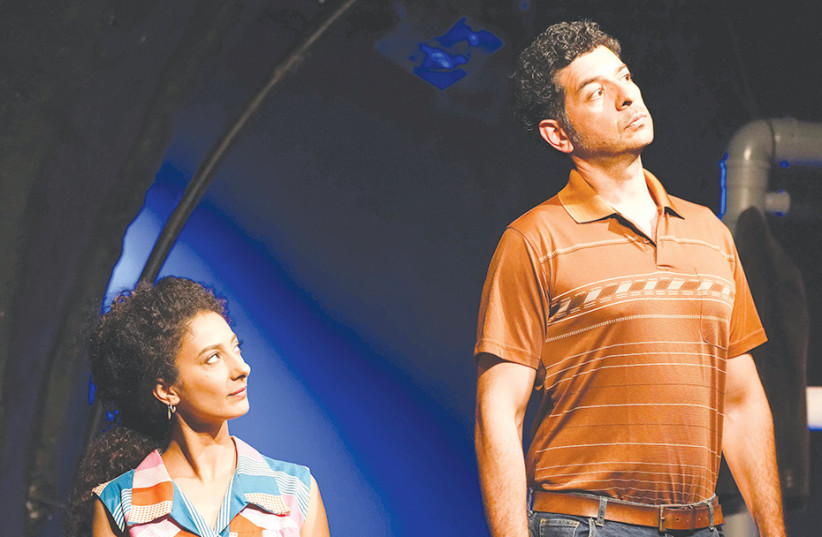When it was originally performed, Hanoch Levin’s 1970 satirical cabaret Shampoo Queen was so provocative that patrons demanded it be taken off the stage after only 19 shows. Theater critic Haim Gamzu described it as “a totality of defective dialogues meant to salt open wounds.”
Director Rabie Khoury has readapted the assortment of sketches, and Levin’s words are now spoken by a troupe of Arab actors.
Khoury plays the role of Samatokha, an Arab waiter humiliated by Israelis. One of them, a woman called Tuvala (Mouna Hawa), expresses her pleasure over the fact the Arab walks on two legs.
“This is Samatokha,” she tells us, “he is our Arab. Samatokha is wise, obedient, and harmless to Jews. He can stand on two legs just like us. Samatokha, show them how well you stand on both feet.”
Because all people walk on two legs, her command is easy to carry out and is also idiotic. Khoury chose to insert another Levin monologue into his character’s mouth. Titled “The Patriot,” it lists six criteria that define an Arab terrorist.

Bassam Biromi puts on an outstanding performance
Any Arab who glances around him is a suspected terrorist, Levin begins. One who looks ahead calmly is suspected of being a cool-headed terrorist. Should the man look up, he might be a religious terrorist; should he gaze down, a shy one. The punchline comes when nobody walks the street. That person is a suspected Arab terrorist who stayed home with the flu.
Levin’s jabs were delivered when Golda Meir served as prime minister. Hawa, who excels at mimicking Meir’s American-accented Hebrew, is hilarious as she crushes her cabinet ministers while assuring us she is “always right.”
Bassam Biromi is outstanding in his delivery of the 1982 monologue “Shabbat Candles.” In it, he plays the role of Lahav. Lahav is a “simple, warmhearted Jew” who longs for meaning in a complex world. As he complains about “nosy, curious folk” who challenge this need and dare make his life harder, he enters a manic state.
In this rage-filled moment he screams “faggots, artists, Communists” to these imaginary persons, and a torrent of slurs follows. Biromi then grabs a plunger and joyfully mows down the mixed multitude. After each killing spree, he gifts us with a little twitch of his nose. This lends the entire performance a cartoonish aspect. Biromi’s Lahav acts like Bugs Bunny but shoots like Elmer Fudd. This is a perfect Shimshon der nebechdicker (Samson the weakling).
Hawa and Biromi perform well together as Ze’ev and Hulda, a clean-cut Israeli couple. When asked by a Mizrahi Jewish character (Rami Saliba as Chimbalulu) how they are doing, Hulda responds: “Ze’ev is an engineer and my father is a developer.” Any attempt by Chimbalulu to question this assertion is crushed by Hulda, who points out that such is life.
“Every Night & every Morn/ Some to Misery are Born,” wrote William Blake. He added “Every Morn and every Night/Some are Born to sweet delight.”
Hulda and the Shampoo Queen are born to sweet delight, Chimbalulu and Samatokha to misery. If the British poet had mystic visions which offered hope of salvation, Levin used language to present us with the unchangeable totality of “it is how it is,” and our own blindness as to why it should be so.
“I am more than a fly,” Rami Saliba offered us during a fantastic performance of the “Fly” monologue. “Have I mentioned I can crush a fly with one finger?”
Just as he used the two-legged Arab Samatokha to reveal to us Tuvala’s idiocy, Levin takes pride in this alleged superiority over an insect and stretches it.
“I can drive a car,” Saliba told the laughing audience. “Does a fly drive?”
He then proceeds to argue that this, too, is a point in his favor, seeing no fly ever attempted to build a tiny car.
An audience member stormed out: it "makes my blood boil"
LEVIN DARED to shock. Inhabiting the character of one of the cabinet ministers, Wattan abd El-ghany asked to say something to the nations of the world. After Hawa granted her this permission, she farted.
A fellow theatergoer left the show in rage after this scene. “This satire was fitting during a time we really were full of ourselves half a century ago,” the man said. “To present Israelis as a dense, brutal people who always feel superior, after the horrors Hamas did to us, makes my blood boil.”
“Samatokha,” meaning mess, is a borrowed word Hebrew took from Russian. Wattan, meaning homeland, is an actual Arab name. Jaffa Theater is perhaps the only place in the country where visitors can pick up Hebrew translations of Arab plays by Saadallah Wannous, Ayman Agbaria, and Salman Natour completely for free. As Iraqi poet Muthaffar al-Nawab wrote, “Each lamp burns according to the amount of oil within it.”
Shampoo Queen will be shown twice on Thursday, December 21, at 6 p.m. and 8:30 p.m. Hebrew only. NIS 95-NIS 110 per ticket. Call (03) 518-5563 to book. Jaffa Theater, 10 Mifratz Shlomo Promenade, Old Jaffa.
